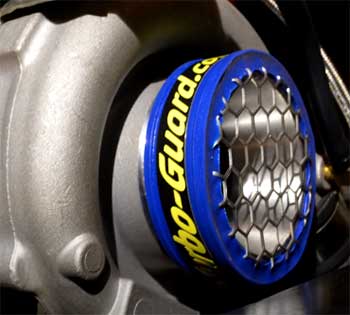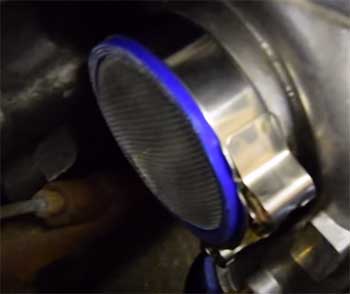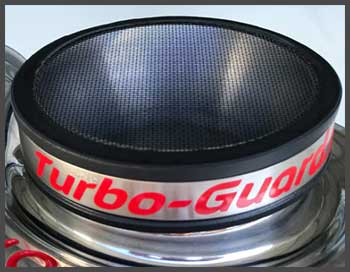Filters protect your combustion chambers from things like debris and dust. You can go for flat Turbo Guard ones or the classic K&N-style ones.
Turbo Guard can’t filter everything, has more power gain, and provides less protection. Filters have less power gain, can filter everything, and give maximum protection.
Filters are more important for turbo engines than most people think. Flat filters like Turbo Guard are popular, but can they beat the OG ones?
Which one should you go for? Here is a side-by-side comparison to help you decide.
A Quick Summary Of The Comparison
| Feature | Turbo Guard | Filter |
| Build and filtering | Needs less space, good filtering | Needs more space, better filtering |
| Power gain | Better | Good |
| Motor protection | Good, depends on the model | Better |
And that’s the gist of the whole thing. Keep reading below for the detailed breakdown.
Key Differences Between Turbo Guard And Filter
The key point is to have something protecting your turbo. Whatever you choose, it is definitely better than having no filter whatsoever.
That being said, Turbo Guard and regular cone filters are a little hard to compare. But they do have differences and their own pros.
The biggest difference between Turbo Guard and regular filters is their build and filtering, power gain, and motor protection.
Here’s how these factors work out in Turbo Guard and cone filters.
- Build And Filtering

Build is probably the biggest difference between Turbo Guard and filter.
Turbo Guard takes up less space and can fit practically anywhere.
But it can only keep bigger dust particles out.
Cone filters need more space and they can filter pretty much everything.
Turbo Guard is a screen filter.
It is flat and you can put it pretty much as is. It doesn’t have any extra exhaust fans to deal with.
So you can put it even in the toughest place inside your car. But it comes at a cost, the filtering isn’t very strong.
Turbo Guard has multiple varieties, from screens that only stop big pebbles to mesh-like ones. But even the most intricate version can’t keep all kinds of dust particles out.
It can only filter the ones we can see. So the smaller particles still get in and can still build up inside the compression chamber.
Cone filters take up more space. There’s the main filter and then there’s the fan that comes with it.
The filter itself takes up more space so if you’re tight on space, cone filters aren’t for you. but the good thing is, this one will keep pretty much everything out.
Cone filters aren’t just mesh-based flat screens. They get as many dust particles as they can, even the ones we can’t see with our eyes.
Plus the fan blocks any big pebble or rock from getting in. When it comes to protecting the motor, filters are just better.
- Power Gain
Yes, filters have an effect on the power output of your car. Turbo Guard has a better power gain than cone filters. If power gain is your concern, you’re better off with the Turbo Guard.
For whatever reason, Turbo Guard is less restrictive than regular cone filters. As the dyno test shows, Turbo Guard can get you 626HP and 599.3ft/lbs torque.
Filters on the other hand are a little more restrictive. You can get around 575HP and 576.1ft/lbs torques.
As you can see, this is surprisingly less than the Turbo Guard. Good thing is, the right filter can give you a higher HP output.
- Motor Protection

This is directly related to the filter density.
Turbo Guard is less dense, so there’s a higher chance of debris getting in.
Regular cone filters block debris better, so your motor gets better protection.
Turbo Guard has multiple filter densities.
The level of protection will depend on which filter you’re using.
If you’re using something less dense, there is a decent chance of pebbles or rocks getting in. This can pretty much fry your motor.
If you’re going for the dense ones, you’ll still get dust buildup inside since the screen can’t block everything.
Regular cone filters are better at filtering so you get less buildup. And the fan blocks rocks and other bigger things from getting in.
So your motor gets better protection from outside issues.
Which One Should You Go With?
Turbo Guard and regular filters aren’t exactly comparable head-to-head. They’re both made for specific use and are pretty good at getting the job done.
Everyone will have a story to tell for both filters. So when you’re choosing one, it is better to prioritize your own preference.
It is tricky, but you can most definitely choose one between these two options. You’ll just have to focus on your preference.
And if you’re into more objective approaches then you’ll have to do some pros and cons calculations to decide.
If you don’t have much space but don’t want to risk dust buildup in your compression chamber, Turbo Guard is the best option for you.
The filters are flat and don’t have any extra parts, so they don’t take up much space. You’ll get pretty good protection against small pebbles if you can pick the right model.
The biggest plus point of Turbo Guard is the power gain. You’ll get more power output compared to regular filters. This is why most people choose Turbo Guard.
But the problem is, Turbo Guard can’t filter everything. There will always be some dust getting in your chambers or worse, some pebble making its way to your motor.

Plus Turbo Guard is more expensive.
If you can spare the space, then filters are the best option.
They’re almost too good to be true.
They’ll keep everything out and give your engine maximum protection.
Since the filtering mechanism is more intricate, it can keep even the smallest particles of dust out.
And the exhaust fan stops things like pebbles from getting in.
The biggest drawback with filters is the power gain. They usually tone down the power output a little. But this is fixable with the right filter. Plus filters are much more affordable compared to Turbo Guard.
Overall, filters are the better option in this case. But if you need more power gain or just don’t have the space, Feel free to go for Turbo Guard. It is better than having nothing at all.
Also Read: Differences Between KC300x Stage 1 And Stage 2 Turbo.
Frequently Asked Questions (FAQ)
Let’s check some questions people usually ask about Turbo Guard, filter, and turbo protection in general.
Only if you’re driving it for a very short time and your track is professionally maintained. If there’s a chance of the track being rough/having dirt, it is better not to drive without any protection.
Turbo Guard stops bigger dust particles and objects from getting into your compression chamber.
Because air filters protect the turbo system from disaster. Putting a filter stops the dust and debris buildup. It also protects the turbo from bigger objects like rocks and pebbles.
Yes, you can put an air filter on your turbo. In fact, it is recommended to put one on.
Final Verdict
Turbo engines are amazing but only when you don’t have to worry about debris from the road ruining them. This is why using protection on turbo engines is recommended.
The Turbo Guard and filter comparison may go on forever, but the choice is ultimately yours.
If you want an objective answer, filters are a better fit for turbos. But if there is a space issue or you want more power gain, then Turbo Guard is what you should aim for.

